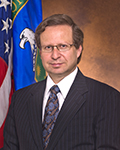
Abstract
Development and population growth are placing unprecedented demands on global resources. This talk will examine these circumstances, both globally and locally.
Global energy demand is growing. Today, fossil fuels provide about 80% of the world’s energy, and the conventional use of fossil fuels is causing carbon dioxide to accumulate in the atmosphere and affect the climate. For the US, this energy landscape poses two largely separable problems: security of supply, which is mostly about liquid hydrocarbons for transport (i.e., imported oil) and greenhouse gas emissions, which arise largely from stationary sources providing heat and power.
How can we bring about the required revolution in our energy system? What technologies do we need and what institutions will best facilitate their development? What policies will be required to hasten development and deployment? What will be the costs? How long will it take? How can we meet these goals while creating jobs and fostering prosperity?
Many of these complex problems also apply to other sustainability issues, including water and food. The challenges of addressing them will set the national and global agendas for the next many decades.
Biography
Dr. Steven E. Koonin was confirmed by the Senate on May 19, 2009 as the second Undersecretary for Science in the U.S. Department of Energy (DOE). Dr. Koonin brings to the post a distinguished career as a university professor and administrator at the California Institute of Technology. He also has experience in the private sector, joining the government from the position of Chief Scientist for BP, plc, based in London.
At BP since 2004, Koonin was responsible for the long-range technology strategy of going 'beyond petroleum' to alternative and renewable energy sources, providing technical advice to senior executives, and managing in the firm’s university-based research programs. Koonin played a central role in BP’s establishing the Energy Biosciences Institute at the University of California Berkeley, the Lawrence Berkeley National Laboratory, and the University of Illinois at Urbana-Champaign.
Koonin joined the Caltech faculty in 1975, was a research fellow at the Neils Bohr Institute during 1976 - 1977, and was an Alfred P. Sloan Foundation Fellow during 1977 - 1979. He became a full professor of theoretical physics at Caltech in 1981 and served as Chairman of the Faculty from 1989 - 1991. Dr. Koonin was the seventh provost of Caltech (from 1995 - 2004). In that capacity, he was involved in identifying and recruiting 1/3 of the Institute’s professorial faculty and left an enduring legacy of academic and research initiatives in the biological, physical, earth, and social sciences, as well as the planning and development of the Thirty-Meter Telescope project.
Dr. Koonin is a member and past chair of the JASON Study Group, advising the U.S. Government on defense science and technology. Koonin has served on numerous advisory committees for the Department of Energy, the National Science Foundation, and the Department of Defense. He is a member of the Council on Foreign Relations and the Trilateral Commission and a fellow of the American Physical Society, the American Association for the Advancement of Science, and the American Academy of Arts and Sciences.
His research interests have included nuclear astrophysics; theoretical nuclear, computational, and many-body physics; and global environmental science. He has been involved in scientific computing throughout his career and is a strong advocate for research into renewable energies and alternate fuel sources. His academic research in computational and nuclear physics has impacted the direction of science both nationally and internationally. Koonin has supervised more than 25 PhD students, produced more than 200 peer-reviewed research publications, and authored or edited 3 books, including a pioneering textbook on Computational Physics in 1985.
Dr. Koonin was born in Brooklyn, New York, received his B.S. in Physics from Caltech in 1972, worked as a summer graduate student at Los Alamos in 1972, and received his Ph.D. in Theoretical Physics from the Massachusetts Institute of Technology (MIT) in 1975. He received the Humboldt Senior U.S. Scientist Award in 1985 and the E. O. Lawrence Award from the Department of Energy in 1998 for "his broad impact on nuclear many-body physics, on astrophysics, and on a variety of related fields where sophisticated numerical methods are essential; and in particular, for his breakthrough in nuclear shell model calculations centered on an ingenious method for idealing, with the huge matrices of heavy nuclei by using path integral methods combined with the Monte Carlo technique."